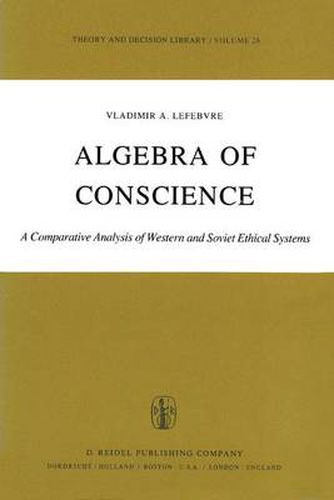Readings Newsletter
Become a Readings Member to make your shopping experience even easier.
Sign in or sign up for free!
You’re not far away from qualifying for FREE standard shipping within Australia
You’ve qualified for FREE standard shipping within Australia
The cart is loading…






This title is printed to order. This book may have been self-published. If so, we cannot guarantee the quality of the content. In the main most books will have gone through the editing process however some may not. We therefore suggest that you be aware of this before ordering this book. If in doubt check either the author or publisher’s details as we are unable to accept any returns unless they are faulty. Please contact us if you have any questions.
In this book two ethical systems are described in the language of mathematics. Ordinarily mathematics is thought to be a science of quantity. Indeed, manipulation of quantities constitutes much of mathematics. Elementary applied mathematics deals with reckoning and measurement, where concrete quantities are objects of attention, such as counting sheep or weighing corno But the operations on these quantities are performed with the help of symbols, from which concrete referents have been ‘abstracted out’: 3 + 5 = 8 regardless of whether the symbols stand for numbers of sheep or tons of corno Thus, the first principle that exhibits the power of mathematics is abstraction. It is one ofthe three pillars on which the edifice of mathematics rests. Another pillar is precision. Ordinarily, man communicates by words. W ords serve communication to the extent that they refer to things, events, states of affairs, feelings of the speaker, and so on. These are the meanings attributed to words. Communication is successful to the extent that the meanings coded upon words by the speaker correspond to the meanings decoded by the hearer. As is weH known, the degree ofthis correspondence varies enormously in different contexts of discourse and with the back grounds or attitudes of the speakers and hearers. Mathematics is a language in which the meanings ofthe symbols (the ‘words’ ofthis language) are absolutely precise. This precision is achieved by abstraction. Abstract terms are defined by their relations to other terms and by nothing else.
$9.00 standard shipping within Australia
FREE standard shipping within Australia for orders over $100.00
Express & International shipping calculated at checkout
This title is printed to order. This book may have been self-published. If so, we cannot guarantee the quality of the content. In the main most books will have gone through the editing process however some may not. We therefore suggest that you be aware of this before ordering this book. If in doubt check either the author or publisher’s details as we are unable to accept any returns unless they are faulty. Please contact us if you have any questions.
In this book two ethical systems are described in the language of mathematics. Ordinarily mathematics is thought to be a science of quantity. Indeed, manipulation of quantities constitutes much of mathematics. Elementary applied mathematics deals with reckoning and measurement, where concrete quantities are objects of attention, such as counting sheep or weighing corno But the operations on these quantities are performed with the help of symbols, from which concrete referents have been ‘abstracted out’: 3 + 5 = 8 regardless of whether the symbols stand for numbers of sheep or tons of corno Thus, the first principle that exhibits the power of mathematics is abstraction. It is one ofthe three pillars on which the edifice of mathematics rests. Another pillar is precision. Ordinarily, man communicates by words. W ords serve communication to the extent that they refer to things, events, states of affairs, feelings of the speaker, and so on. These are the meanings attributed to words. Communication is successful to the extent that the meanings coded upon words by the speaker correspond to the meanings decoded by the hearer. As is weH known, the degree ofthis correspondence varies enormously in different contexts of discourse and with the back grounds or attitudes of the speakers and hearers. Mathematics is a language in which the meanings ofthe symbols (the ‘words’ ofthis language) are absolutely precise. This precision is achieved by abstraction. Abstract terms are defined by their relations to other terms and by nothing else.